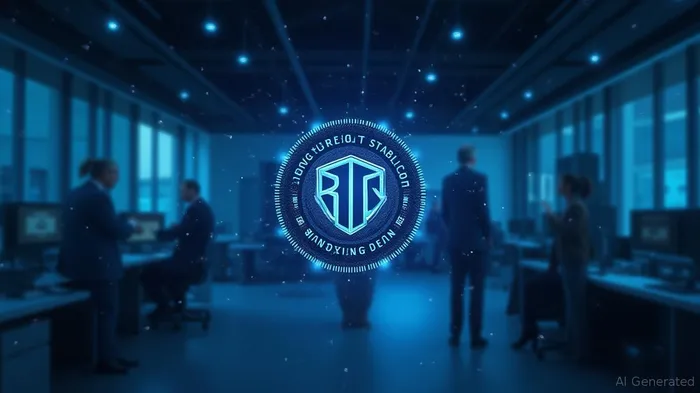BTQ Technologies Launches Quantum Stablecoin Settlement Network for Enhanced Security
BTQ Technologies has introduced the Quantum Stablecoin Settlement Network (QSSN), a pioneering framework designed to safeguard stablecoin platforms from the emerging cybersecurity threats posed by quantum computingQUBT--. This next-generation framework is being developed to assist banks, payment providers, and digital assetDAAQ-- platforms in issuing and managing stablecoins with built-in protection against quantum-era cybersecurity risks.
The QSSN framework is designed to support a wide range of stablecoin models, including JPMorgan Chase's proposed USD deposit token (JPMD), leading fiat-backed stablecoins like CircleCRCL-- and Tether USD, regulated bank-issued stablecoins, and real-world asset tokens. By providing tools to issue and manage stablecoins in alignment with evolving regulatory and national security standards, QSSN aims to support the next phase of stablecoin market growth.
The stablecoin sector has rapidly expanded into a $225 billion market, driven by growing institutional demand, real-world applications, and regulatory clarity. As stablecoins become more integrated into global financial infrastructure, governments and regulators are introducing new requirements to ensure their long-term security, particularly in response to the growing capabilities of quantum computing. In the U.S., recent federal mandates call for quantum-safe technology across critical infrastructure, including digital assets and tokenized financial products. BTQ's QSSN is designed to help stablecoin issuers meet these requirements by adding a secure, future-proof layer to the most sensitive aspects of stablecoin platforms, without changing how businesses, institutions, or users interact with these digital currencies.
BTQ's QSSN provides a clear pathway to future-proof the proposed JPMorgan ChaseJFLI-- USD deposit token (JPMD) in line with U.S. federal cybersecurity standards. Recent policies, including National Security Memorandum-10 and the NSA's Commercial National Security Algorithm Suite 2.0, require critical financial systems to migrate to quantum-resistant cryptography before 2030, with many standards already in effect. BTQ's solution would allow JPMorgan—or any issuer of tokenized deposits—to secure their stablecoin platform by upgrading only the core functions used by the bank's treasury or designated operator, such as minting and burning tokens, administrative controls, and initial contract deployment. Using BTQ's proprietary CASH hardware and QSSN framework, these privileged transactions will be cryptographically signed with both standard ECDSA keys and quantum-safe Falcon-512 signatures. This allows for compliance with emerging quantum security mandates while preserving all existing token logic, KYC processes, allow-list requirements, and user workflows.
The broader stablecoin ecosystem remains unchanged, meaning institutional and retail holders interact with the token as they do today, and existing wallets, reconciliation processes, and regulatory reporting remain intact. Only the issuer's authentication path adopts quantum-safe protections, offering improved security with reduced disruption. This approach allows major financial institutions to comply with U.S. quantum-resilience policies without overhauling their operational infrastructure.
The QSSN framework will enhance security for core stablecoin functions while maintaining full compatibility with existing payment systems and compliance processes. It will enable seamless adoption for both new and existing stablecoin issuers, positioning BTQ as a critical technology provider for secure, scalable digital finance. "The growth of stablecoins is reshaping global payments and financial markets, but these platforms must be built on secure foundations," said Olivier Roussy Newton, CEO and Chairman of BTQ Technologies. "QSSN positions BTQ at the forefront of this transformation, enabling banks, institutions, and innovators to meet emerging regulatory expectations for quantum security, without disrupting user experience or market functionality."
Stablecoins have become a critical part of the digital asset economy, powering real-world asset tokenization, payments, cross-border settlement, and yield-generating financial products. At the same time, governments are accelerating timelines for quantum-proofing national infrastructure, presenting both a challenge and a significant market opportunity for technology providers. In the United States, the pending GENIUS Act—a bipartisan bill advancing through Congress—seeks to establish comprehensive federal guidelines for fiat-backed stablecoins, further reinforcing the need for secure, compliant, and resilient digital currency infrastructure. With the introduction of the GENIUS Act and its anticipated approval, there will come a time—sooner rather than later—when digitized money becomes mandated by law.
BTQ, having collaborated with NIST and other standards bodies for over a decade, is committed to shaping that future. The Company intends to actively propose technical legislation and standards to ensure that digital currencies, including stablecoins, are built on quantum-secure foundations. With QSSN, BTQ will offer a scalable, revenue-generating platform to support secure stablecoin issuance and management, enabling banks, payment providers, and digital asset companies to confidently meet both market demand and regulatory expectations in the years ahead.

Quickly understand the history and background of various well-known coins
Latest Articles
Stay ahead of the market.
Get curated U.S. market news, insights and key dates delivered to your inbox.

Comments
No comments yet